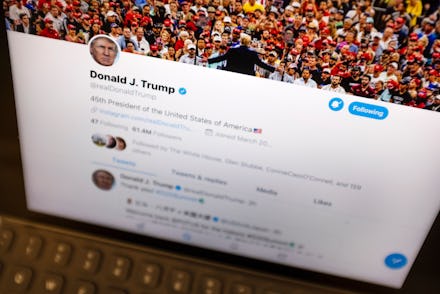The president can't block people on Twitter any more

The President of the United States is no longer allowed to use the block button. The United States Court of Appeals for the Second Circuit upheld a previous ruling that found President Donald Trump to be in violation of the Constitution by blocking people who criticize and taunt him on Twitter. As a result of the ruling, President Trump will have to unblock any accounts following @realDonaldTrump so they can once again see statements made by the leader of the free world.
Trump's liberal use of the block button has been the subject of legal challenges since shortly after he took office. Back in July 2017, the president was sued by civil liberties group Knight First Amendment Institute at Columbia University on behalf of seven Twitter users who were hit with a block from the President. Trump eventually unblocked the specific accounts involved in the lawsuit but maintained the rest of his block list. All the while, the legal team at the Justice Department tasked with defending Trump's actions has held that because the President is blocking people from his personal account, @realDonaldTrump, and not the official account of the President, @POTUS, that he isn't impeding anyone's rights. Essentially, they said, Trump is blocking people as a private citizen, not as the President of the United States.
That argument didn't fly with the courts. In May 2018, a federal judge in New York determined that Trump's decision to block people on Twitter was unconstitutional. The judge noted that Trump operates his personal account as if it is an official government account. He makes policy decrees and announcements about his administration from the account, just as any other president would from the actual, official Twitter account for the office holder. Essentially, as long as he's conducting official business for the country from the account, he has to let citizens see it. While the Trump administration appealed the ruling, the courts have upheld the decision. “We conclude that the evidence of the official nature of the account is overwhelming," Judge Parker, who heard the appeal, wrote in his ruling. "We also conclude that once the president has chosen a platform and opened up its interactive space to millions of users and participants, he may not selectively exclude those whose views he disagrees with.”
The ruling will have some interesting long-term effects that have yet to play out. It establishes that the First Amendment prohibits government officials on social media from excluding people from the conversation, even when they disagree. It's not clear how the ruling might come into play on further attempts to apply the First Amendment to online discourse.
For now, it will have one important short-term effect: Trump will have to unblock his many critics on Twitter. The President, or whoever happens to have access to his Twitter account, will now have to go through and once again allow all of the people who have peeved Trump enough to receive a block to follow his account. There's no telling just how extensive a list that is, so thoughts and prayers to the person who will spend the next day undoing the President's unconstitutional actions.